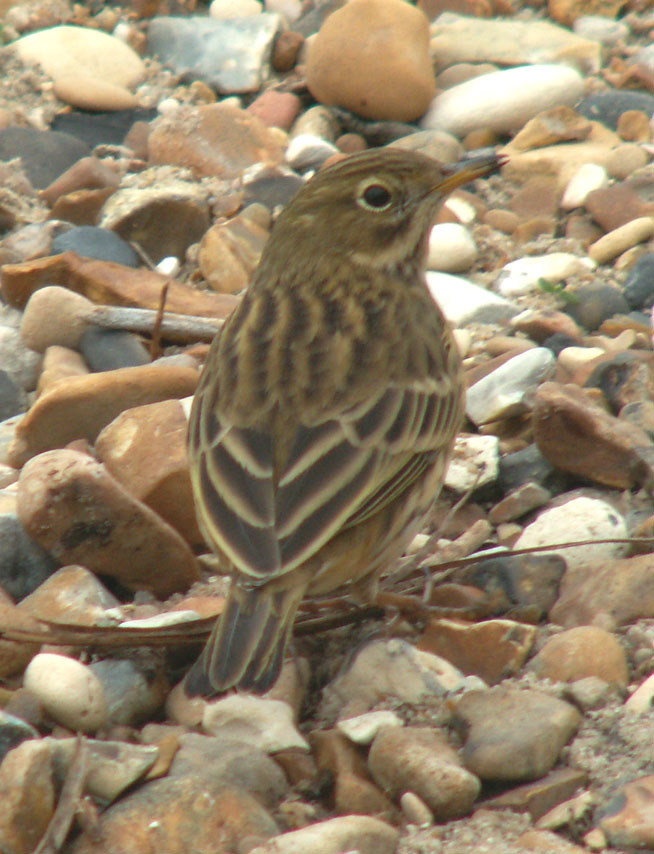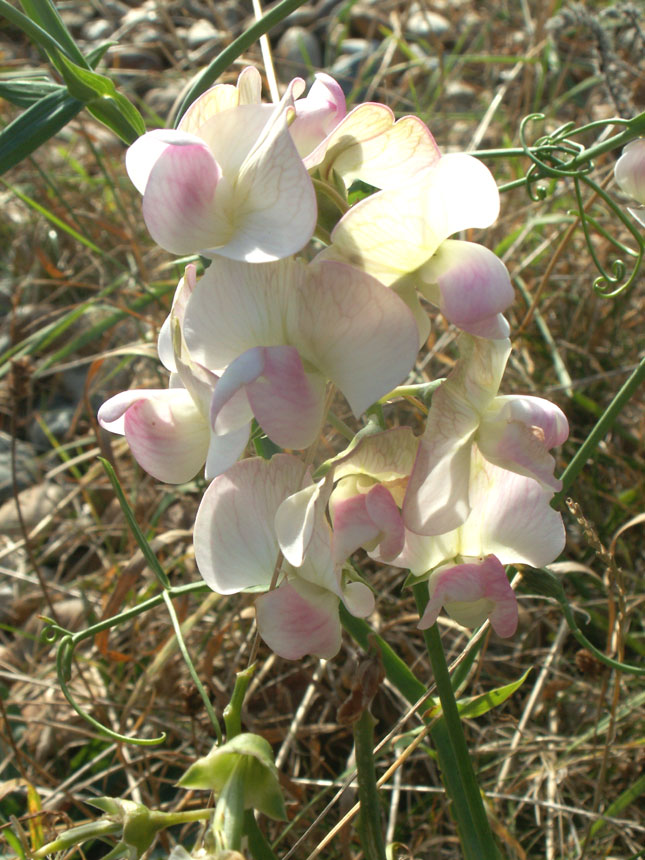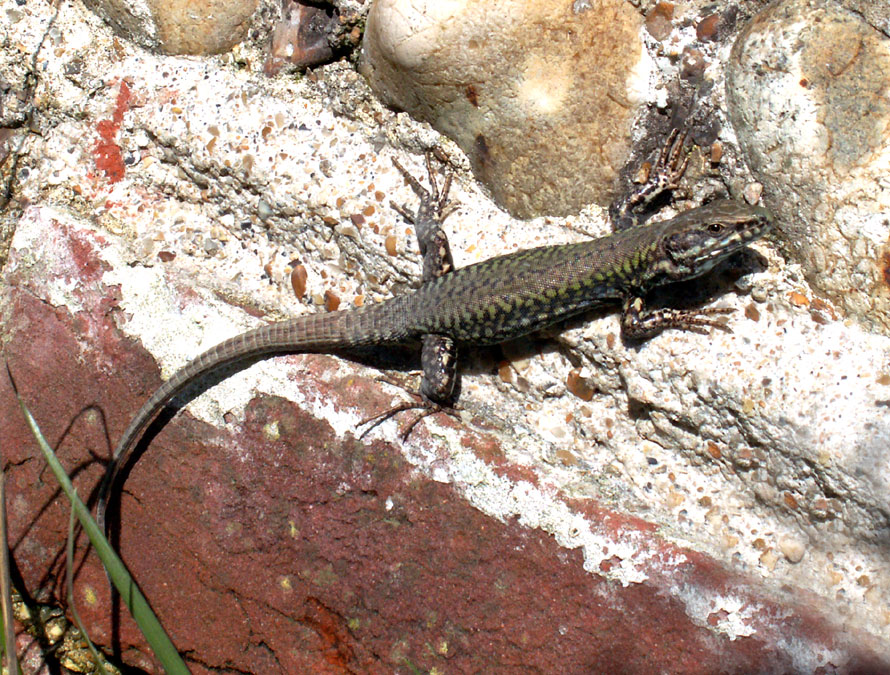Coastal
Zone
THE
ADUR SHORE
Shoreham,
Southwick and Lancing beach areas above High Tide mark
|
Overview
Shoreham
Beach is a shingle spit about three miles long, separated from town of
Shoreham-by-Sea (Sussex) by the River
Adur, which been has deflected eastwards by the
longshore
drift over the centuries. Wood and rock groynes have been installed
to stabilise the moving shingle and to minimise erosion and prevent flooding.

|
|
Sea
Beet
|

|
Sea Campion
|

|
| |
Turnstones on Shoreham
Beach
|
Wildlife
Reports
Reports
2008
4 December
2007
On
the strandline of Shoreham Beach, I discovered
an intact shell (=test) of the Purple-tipped
Shore Urchin,
Psammechinus miliaris,
on the strandline. Discoveries are unusual because this urchin is scarce
intertidally
and because the test is very fragile and gets quickly bashed to bits. The
sharp spines had all broken off.
There
were thousands of Slipper Limpets
and frequent Whelk, Buccinum,shells
seen in a few minutes as I was buffeted by the breeze.
BMLSS
Echinoderms
24
November 2007
A
half a dozen Oystercatchers
trotted over the rock defences on the seaward side of Widewater
Lagoon.
| On
the shingle beach, aMeadow
Pipit
fed in the landward side of the
beach huts. It showed a olive green hue which
is not all that clear in the photograph on the right.This bird was contrasted
to a taller and slenderer
Rock Pipit
seen on the Sea Purslane
on the edge of the River Adur on 22
November 2007. |
 |
 |
14
November 2007
At
least 25 Turnstones
took
off from Lancing
Beach. Thrift,
Dandelions,
Ragwort and Hawkweeds
were still seen in flower around the
Old Fort. A Rock Pipit
perched on the flint and brick of the Old Fort long enough to recognise
it to species. And a Red Fox
defecated in broad daylight amongst the bushes of the most easterly roundabout
along Old Fort Road.
8
November 2007
Plants
in flower along the cyclepath by Widewater
spotted as I cycled past included Red Valerian
(one), Viper's Bugloss,
Cow Parsley, Yarrow, Hawkweeds, Scentless
Mayweed and a Wallflower,
Lobularia
maritima.
This was a garden escape. It is native to
the Mediterranean region and Macaronesia (Canary Islands, Azores).
|
 |
There
was again a dozen Turnstones
on Lancing Beach trotting along the
extra lorry loads of shingle that had been deposited to protect the shore.
26
October 2007
About
10:30
am, there apppeared to be about a dozen Turnstones
on Lancing Beach, but when disturbed
a flock of about 35 rose and the flock swirled in a slight curve before
settling thirty metres to the east. One Wheatear
(over the shingle by the Golden Sands Caravan Park in Lancing) showed its
white tail and there were a dozen plus Meadow?
(or Rock) Pipits which occasionally perched
on the wooden groynes. I looked out to sea
for the seal,
but I could only spot two Cormorants
on the surface and actively diving under.
26
September 2007
Two
Wheatears
flew over the shingle by the Golden Sands Caravan Park in Lancing.
11
September 2007
In
the warmth (20.4 ºC)
of the midday
sun, the six Wall Lizards, Podarcis
muralis, seen on the Old Fort
on Shoreham Beach were particularly lively clambering much further up the
wall on two occasions than I had ever seen them do before, with behaviour
uncharacteristic of the Common Lizard.
One Wall Lizard basked on a ledge right near the top of the wall and another
skittered that high before disappearing around to the shady side and out
of view. A male Common Blue Butterfly
fluttered by and then settled.
Adur
Lizards
5 September
2007
A
faded Painted Lady Butterfly
fluttered over Shoreham Beach Green on the green open space by the toilet
block.
Adur
Butterfly List 2007
3 September
2007
The
summer seems to be over even before it has started; three Wheatears
were seen on Lancing Beach by Widewater,
feeding amongst the vegetation before making their long flight south. Their
white tail feathers were most noticeable as they flew from one wooden post
to another.
 |
3
September 2007
This
plant
was
seen on the pebbles on Shoreham Beach by (north of) the beach huts by the
toilet block on Shoreham Beach Green.
This
looks like the Broad-leaved Everlasting-pea,
Lathyrus
latifolius.
Flora
of Shoreham-by-Sea (List) |
 |

Broad-leaved
Everlasting-pea,
Lathyrus
latifolius. |
July
2007
I
have discovered Starry Clover, Trifolium
stellatum,
growing in my garden at 58 Riverside Road, Shoreham Beach. I know it used
to grow at my mother's house at 49 Riverside Road but it was killed off
by flooding river water. Other nearby locations have been "developed".
4
July 2007
I
walked Shoreham Beach from the Old Fort to Widewater,
and back via Shoreham Harbour.
Four adult and one flying young Ringed
Plovers were spotted not far west of the
Old Fort, nine Sandwich Terns
on Southwick Beach and odd ones at sea, a Rock
Pipit at the Old Fort, and a total of
16 Sand Martins
flying west into the wind. From the town Footbridge
two more Sandwich Terns,
one Yellow-legged Gull
and one Oystercatcher.
By the houseboat creek there were ten Redshanks,
a Lapwing and
a Common Sandpiper
with another by the Toll Bridge.
A total of seven Little Egrets were
encountered.
Comment:
the breeding success of the Ringed Plovers
is noteworthy.
Adur
Estuary
9 June
2007
A
Painted
Lady Butterfly fluttered around the Red
Valerian just south of the Footbridge.

31 May
2007
Kidney
Vetch was flowering on Shoreham Beach
just to the east of the Church of the Good Shepherd. Yellow-horned
Poppies, Red Valerian, Viper's
Bugloss and
Sea
Campion were all flourishing.
23
May 2007
An
exceptionally green and heavily gravid female Wall Lizard, Podarcis
muralis, skittered out from a clump of Sea Kale on the shingle
part of Shoreham Beach south of Shingle
Road. Apparently, they are often seen in this area and in the gardens of
the houses and the school grounds in the same road.
NB:
I have also received past reports from two separate reliable sources of
a
green lizard
brought in by a cat and lots of unidentified lizards in a garden (by a
visitor not the owner) from the same area.
Lizard
Reports and Comparisons
21
May 2007

Common
Poppies and Yellow-horned
Poppies are in flower in the rain on Shoreham
Beach.
16
April 2007
A
Peacock
Butterfly landed on the flint wall of
the Old Fort and a Holly Blue Butterfly
fluttered over Ferry Road. In the sunshine just one Wall
Lizard was seen on the Old Fort, skittering
from the grass over the pebbles to the flint wall.
Thrift,
Red
Valerian, Ragwort and
Sea
Campion were beginning to flower.
26
March 2007
Garden
escape plants in flower decorate the higher (furthest from the sea) shingle
parts of Shoreham Beach including Spring
Starflower,
Ipheion
uniflorum, Grape Hyacinths,
the first Bluebells of
the year and Narcissus.
11
March 2007
At
least 21 adult Wall Lizards, Podarcis
muralis, were spotted on the flint wall of the Old Fort, Shoreham
Beach, basking in the sunshine and displaying far more energy that
I had ever seen before with one lizard skittering right up to the top of
the wall. With an air temperature of 14.4
ºC at 1:53 pmit
was the warmest day of the year so far.
Adur
Lizards
A rather
dark Peacock Butterfly
fluttered in the sunshine over the Old Fort.
Adur
Butterfly List 2007
26
February 2007
At
mid-tide (with sand showing) about fifty (estimated) Sanderlings
flew in a tight flock over the sea opposite Brooklands.
 25
February 2007 25
February 2007
Danish
Scurvygrass, Cochlearia
danica, burst
into tiny flowers on Shoreham Beach
between Ferry Road and the row of beach huts to the west.
Flora
of Shoreham-by-Sea
24
February 2007
A
dead Gannet,
a dead Puffin,
and other sea birds,
together with miscellaneous cargo debris were
discovered washed up on Shoreham Beach.
Dozens of pens, car parts, chocolate boxes and bars were seen. These
two sea birds are not usually washed ashore in Sussex in such a fresh condition.
If
these are as a result of the deliberate stranding of the container ship
'Napoli' off Dorset, the
cargo and pollution must have spread all along the south coast. However,
no reports have been received of other debris.
BMLSS
Strandline Reports
18
February 2007
Nine
Oystercatchers
on
a wooden pier in the Shoreham Harbour entrance at high tide was unusual.
They appeared to be feeding and the only obvious prey was the Bilge
Bug, Ligia oceanica. Two or three Turnstones
were foraging on the strandline by the Old
Fort and scores of Pied Wagtails
were seen snapping up small insects on the shore.
The
usual natural debris of millions of Slipper
Limpets, hundreds of
Whelk egg masses, Tertiary
Lignite (sea coal) seaweed,
and the occasional Cuttlebone
were washed up on the shore, the day that a 12 metres long motor
yacht caught fire out on a calm sea and the smoke rose vertically as
there was little to no wind.
6 February
2007
A
brightly coloured Stonechat
was seen over the shingle beach near the Church of Good Shepherd. Lancing.
24
January 2007
South-east
England woke after an overnight flurry
of snow and Shoreham was no exception
with a layer in Shoreham town and even on the
beach pebbles and in the countryside.
As
the air temperature was always above freezing and the dew point only just
below zero Celsius, so by the early afternoon much of the snow had melted.
Shoreham
Weather Highlights 2007
Coastal
Wildlife 2006 (Link)
BMLSS
Molluscs
BMLSS
Marine Gastropods
|

























